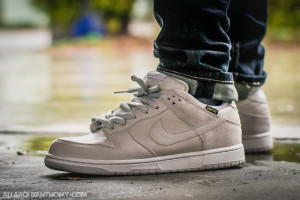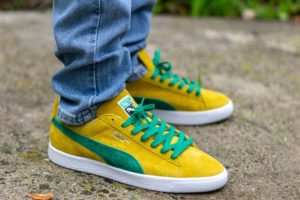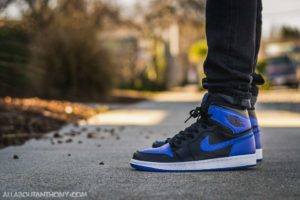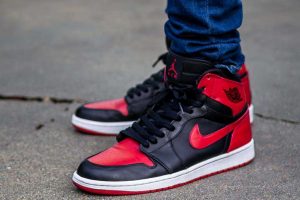Wet weather is often the arch-nemesis of the sneakerhead. We spend all this money on nice pairs for our collections, and step outside only to get them drenched. In this article we examine wearing sneakers in the rain!
You Can Wear Sneakers In Rain
The wet weather can damage certain types of materials though, so shoes made of dark leather or water-resistant materials are advisable vs suede and other delicate materials.

This shoe contains elements of water
resistant Goretex… and suede?
Wet weather can damage certain types of materials very quickly, and can even make sneakers stink if not aerated properly! Aggressively rocking some kicks in the rain can make them deteriorate faster. For sneaker enthusiasts and collectors this is an issue, as most want to keep their sneakers as pristine as possible while wearing.
The sad truth is there’s no certain way to keep a pair of sneakers 100% perfect after being caught in the rain. The good news is that there are pairs you can choose where the impact of the rain is less extreme over time.
Few items of clothing are truly waterproof, especially when it comes to sneakers. At best, most sneakers that function well in the rain are water resistant. For example, Nike releases Gore-tex enhanced pairs and “winterized” pairs every year, typically towards the end of the fall season. While these might keep your feet dry, any suede or other delicate materials on these kicks will still take damage from the rain.
None of this should stop you from wearing sneakers in wet weather. However, you can make smarter choices about which pairs you expose to the elements.
Rain Can Ruin Sneakers
While rain won’t completely destroy most sneakers, it can damage the materials and also stink if not allowed to air out and dry properly.

Talk about a shoe that would get
destroyed in the rain!
Most pairs that you buy should hold up in the rain. After all, sneakers are designed to be worn, and if they can’t handle a little basic wet weather, then they aren’t good sneakers! However, certain materials used on sneakers will be more problematic when doused in rain.
The top materials to watch out for are suede (including nubuck), mesh, hemp and top quality leather.
Suede, and to a lesser degree nubuck, will completely change when hit with rainy weather. The big deal about these materials is the soft texture, which is delicate and essentially ruined once it gets soaked. While the shoe will still be wearable, it won’t ever have the exact same texture as it did when new.
Materials like hemp and canvas might seem rugged, and they may well be good at not taking a lot of actual damage from rain. However rainwater generally contains some amount of dirt, and hemp and canvas looks dingy fairly quickly after being caught in a rainstorm. This may be cleanable or it may not.
Higher quality leathers tend to stain in certain ways. For some, this is part of the appeal, vs a more “plasticky” cheaper leather. In the rain though, the cheaper leather can win out as it generally will not develop the same worn look as a full grain leather.
As for the “stink”, certain bacteria like to hang out in damp places, so if you do get a sneaker wet, especially on the interior, be sure to air it out as soon as possible to curb the formation of said bacteria.
How Well Jordans Hold Up In The Rain
Jordans can hold up surprisingly well in the rain, provided the upper is all leather. Suede and nubuck will change texture when soaked by wet weather, but many of the all-leather pairs are tanks!

The dark, all-leather upper makes these
tanks in the rain!
As mentioned above, cheaper leathers actually do a bit better in wet weather as far as looks. They may not be functionally as hardy or luxurious as their full-grain counterparts, however they are easier to clean and recover a bit quicker from a day out in the rain.
So can you wear leather Jordans in the rain? I actually opt for it! Some of my favorite rain shoes are all-leather Jordan 1 highs. The high cut helps keep my pants away from the ground and thus slightly drier. The leather upper tends to be on the cheaper side on most 1s and thus cleans up well. I opt for darker colors like those found on the Royal 1s. The combination of smooth leather and dark colors means you can barely tell I’ve gotten these pairs wet at all!
Jordans Are Not Waterproof
Most Air Jordans are not waterproof by default. Some pairs such as the Air Jordan 1 Element contain Gore-tex technology which helps them be more durable and water-resistant.
What Trainers Are Waterproof
Check for modern runners and hiking sneakers with Gore-tex or similar enhancements. These are generally designed for outdoor use in all different kinds of weather. The sneaker will usually state in its marketing or included tags how water-resistant it is.
What Sneakers To In The Rain If You Don’t Have Waterproof Sneakers

Another Tank For the Rain
My strategy for rainy weather is the following:
- Choose a dedicated beater. This is also my strategy for keeping the bulk of my shoes clean. If I know I’m going somewhere where there’s going to be a lot of dirt, or just wet weather in general, I will have a sneaker I have assigned for this type of weather. I know and accept that this shoe is here to take damage so the rest of my pairs don’t have to.
- I don’t like to use protectant or waterproofing sprays as I think they can affect the texture and color of sneakers. However, many find these useful so if they are your thing, don’t let me stop you. For my purposes, having a pair of dedicated beaters as mentioned above removes the necessity of spraying my other pairs down with protectants.
- For rain beaters, I opt for a pair that is intended for outdoor wear such as a winterized sneaker or a modern runner designed for all-terrain and wet weather.
- As an alternative, I find dark-colored leather sneakers made from cheaper leathers to also make good rain beaters. The lesser quality smooth composite leathers used on a lot of sneakers (many Jordans for example) tend to clean up easily and are built like tanks. I try to opt for a pair with darker colors and no open mesh panels. Most look almost good as new once they are given a quick clean-up after wearing them out.
Waterproof Sneakers Are Worth It
If you live somewhere that gets a lot of rainy weather, a pair of water-resistant sneakers will last a lot longer. These kicks will help avoid wetness, coldness and stinky bacteria.
Personally, I don’t see enough rain where I live to warrant buying some waterproof boots. However, many live in areas that are constantly inundated by heavy rain. If you live in a place like that, buying a dedicated waterproof pair might be very helpful. For the rest of us, a pair of beaters that we set aside for rainy days can be enough.
